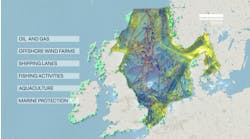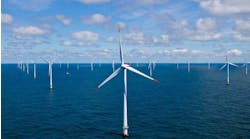North Sea association stunned by threat of further windfall tax
Offshore staff
LONDON — Offshore Energies UK (OEUK) has warned of reduced investments in North Sea E&P if Britain’s Chancellor Jeremy Hunt raises the windfall tax on the industry’s profits on oil and gas production to 35%.
Reports suggest Hunt could announce the move in a budget statement later this week, as the government seeks ways of lowering Britain’s debts.
OEUK said its members have been shocked by the reports of the proposed increase.
The short-lived administration of the recently deposed Prime Minister Liz Truss had been working on measures to make the North Sea more attractive to investors.
The association said the UK’s oil and gas producers were already effectively paying a tax of 40%—the highest for any industrial sector, it added—before then Chancellor Rishi Sunak (now Prime Minister) imposed an additional 25% windfall tax earlier this year.
So if, as reported, a further 10% (windfall) is introduced, that would lift the overall tax level to 75%. At that rate, OEUK said, many of its oil and gas producer members would have to reconsider investment plans.
The association has communicated to Hunt that long-term fiscal stability and “intelligent taxation” are essential to a sector that plans and invests over years or even decades. And a fall in investment would soon lead to declining production of the UK’s gas and oil, damaging jobs, undermining energy security and increasing the need for imports.
OEUK pointed out that the Chancellor can only tax the profits on oil and gas produced in UK waters, not profits earned on overseas production, even for companies based in the UK.
A spokesperson said that oil and gas accounts for 75% of Britain’s energy mix, adding, “Our industry plays a critical role in providing reliable and responsible supplies of energy to the UK…
“We need a diverse range of offshore operator and supply chain companies with the skills and people to build the low-carbon energy future we all want to see. It deeply concerns us that that the complexity of the UK offshore energy sector is not being considered when we are on the cusp of such an important transition."
OEUK has noted that the UK’s net import bill of £39 billion (US$45.9 billion) for oil, gas and electricity between January and September this year was five times higher than for the same period last year, according to government trade statistics. This includes supplies from Russia.
A House of Commons Library report issued over the weekend stated, “Overall energy imports from Russia in the year to September 2022 were £3.68 billion [US$4.33 billion].”
Outgoing OEUK Chief Executive Deidre Michie commented, “With the UK paying a net £39 billion for imports, people will wonder why we are not prioritizing gas produced here and encouraging companies to invest in the North Sea.
“Gas which is shipped to the UK from across the world will also always have greater emissions than gas which is piped to our shores from the North Sea because of the extra energy needed to compress it, transport it and then turn it back into gas.”
11.15.2022



